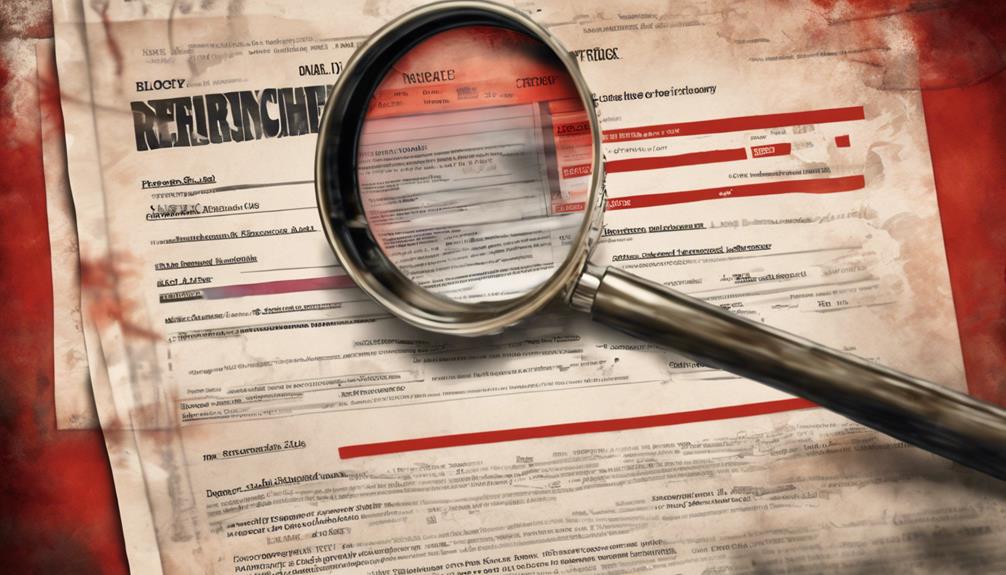Employers typically examine the last 7 to 10 years of a candidate's background when conducting job background checks, aligning with Fair Credit Reporting Act (FCRA) guidelines. This time frame is commonly considered standard practice to assess a candidate's suitability for employment. By focusing on recent history, employers aim to gather relevant information while adhering to legal regulations. This approach guarantees a fair and accurate representation of a candidate's background during the hiring process.
Key Takeaways
- Typically 7 to 10 years of history reviewed.
- FCRA sets 7-year limit for non-convictions.
- State laws may impose additional restrictions.
- Some high-wage jobs have exceptions to the 7-year rule.
- Written consent required before conducting background checks.
Timeframes for Background Checks

Employers typically review the last 7 to 10 years of a candidate's background when conducting employment background checks. This timeframe is in line with the Fair Credit Reporting Act (FCRA), which governs the use of background checks for employment purposes.
When it comes to criminal records, these checks usually cover the past 7 to 10 years to provide employers with relevant information while also aligning with fair chance hiring practices. County criminal background checks, which are common in these screenings, also adhere to this time frame to ensure a thorough review of an individual's history.
Additionally, professional license verification checks may look back from the issuance date of the license to confirm the candidate's credentials. While some types of checks, like credit history checks, are limited to the past 7 years, education verification checks have the flexibility to explore further back into a candidate's academic background.
Laws Governing Background Checks
Federal and state laws play a pivotal role in governing background checks for job applicants.
Legal time frame limits, such as the 7-year rule in Texas, impact how far back certain information can be reported.
Ensuring compliance with these regulations is essential for employers to conduct background checks lawfully and ethically.
Legal Time Frame Limits
How long do laws governing background checks typically allow for the reporting of non-conviction information?
The Fair Credit Reporting Act (FCRA) establishes a standard 7-year lookback period for background checks, specifically for non-conviction details. However, individual states, such as Texas, may have specific regulations regarding the timeframe for reporting criminal records.
In Texas, there are restrictions on how far back employers can consider criminal convictions in certain circumstances, often aligning with the 7-year limit set by the FCRA. Exceptions to this 7-year rule might be applicable for candidates applying for high-salary positions or roles with unique legal requirements.
Employers conducting background checks are obligated to adhere to both federal FCRA guidelines and relevant state laws when determining the permissible time frame for gathering background information. It's essential for employers to stay informed about the legal requirements in their jurisdiction to ensure compliance with the law.
Impact on Hiring
The regulations surrounding background checks have a significant impact on the hiring process. Employers must navigate federal and state laws, including the Fair Credit Reporting Act (FCRA), which dictate the permissible lookback period for conducting background checks. These laws ensure fairness and compliance in evaluating candidates based on criminal records, credit reports, and employment history.
Understanding the specific requirements for each type of background check is vital to avoid legal pitfalls and potential discrimination issues. State laws may impose additional restrictions or requirements on background checks, further complicating the hiring process. Exceptions to the standard lookback period of 7 to 10 years may exist for certain roles, such as those in high-salary positions or regulated industries.
Employers must stay informed about the evolving landscape of fair hiring laws to make informed decisions when conducting background checks. Failure to comply with these regulations can lead to legal consequences and tarnish an organization's reputation in the recruitment process.
Compliance With Regulations
Employers conducting job background checks must adhere to regulations outlined in the Fair Credit Reporting Act (FCRA) to guarantee adherence with national standards on reporting various types of information. To secure compliance with FCRA and state laws, employers must consider the following:
- Time Limits: FCRA sets specific time limits for reporting various types of information in background checks, such as bankruptcies, tax liens, and collection accounts. After these timeframes, certain information may not be reportable.
- Criminal Background Checks: While FCRA allows reporting of criminal convictions at any time, some states like Texas restrict reporting them after a certain period, typically 7 years.
- Written Permission: Employers must obtain written permission from candidates before conducting background checks to adhere with FCRA regulations.
- State Laws: In addition to FCRA guidelines, employers must also be aware of specific state laws governing background checks, such as those in Texas, to secure full compliance.
County Resources for Background Checks

Individuals seeking background check information can utilize county resources available in Texas, with major counties like Harris and Dallas offering public records access. These county resources play an important role in conducting thorough background checks, as each county may have its own regulations and resources for accessing public records.
For example, Collin County provides an online database for background screening purposes, while Bexar County allows access to criminal records through its District Clerk's Office. In Denton County, individuals can obtain court records online to gather the necessary information for background checks.
Similarly, Fort Bend County permits public access to court records and other public information essential for background screening processes. By leveraging these county resources, individuals and organizations can ensure detailed background checks in compliance with the specific regulations and access methods of each county in Texas.
FCRA Regulations on Background Checks
When conducting background checks, it's crucial to adhere to the regulations outlined by the Fair Credit Reporting Act (FCRA), which sets national standards on reporting various types of information.
Under the FCRA regulations:
- Bankruptcies aren't reportable after 10 years, tax liens after 7 years post-payment, and collection accounts after 7 years.
- Civil suits, judgments, and other negative information are typically not reportable after 7 years from the date of entry.
- Exceptions to the 7-year rule may apply for certain high-salary job applicants in background checks.
- Criminal convictions can be reported at any time under the FCRA, but some states, like Texas, restrict the reporting of criminal convictions after 7 years.
These regulations guarantee that the information provided in background checks is accurate, fair, and compliant with federal standards set forth by the FCRA.
Employers conducting background checks must navigate these guidelines to make informed decisions regarding potential hires.
Criminal Convictions Reporting Requirements

Employers should be aware of the time limits for reporting criminal convictions, as set forth by the Fair Credit Reporting Act (FCRA) and specific state regulations.
Exceptions to these time limits may exist for certain high-salary job positions, requiring careful consideration during the hiring process.
It's vital for employers to obtain candidates' written consent before conducting background checks on their criminal history.
Time Limits for Convictions
Under the Fair Credit Reporting Act (FCRA), there are no specified time limits for reporting criminal convictions in background checks. However, some states, like Texas, have implemented the 7-year rule for reporting criminal convictions.
In Texas, this rule restricts the reporting of criminal convictions beyond 7 years in most cases. Exceptions to the 7-year rule may apply for high-salary job applicants in specific circumstances.
Employers conducting background checks for high-salary positions must comply with state laws, obtain permission from job applicants before initiating criminal background checks, and notify candidates about the process. Adhering to these requirements ensures that the background check process is equitable and transparent for all parties involved.
Reporting Exceptions for Jobs
Some states, like Texas, provide exceptions to the standard 7-year reporting rule for criminal convictions in background checks for certain high-wage job applicants. While federal regulations allow the reporting of criminal convictions at any time, Texas state laws limit the reporting of such convictions to the past 7 years for most job applicants.
However, there are exemptions to this seven-year rule for individuals applying for high-wage positions. Employers conducting background checks in Texas must make sure they comply with both state and federal laws regarding the reporting of criminal convictions.
These exceptions for high-wage job applicants in Texas highlight the significance of understanding the specific rules and regulations governing background checks in different states. By staying informed about state laws, employers can navigate the complexities of background check requirements and make informed decisions when evaluating job applicants with criminal histories.
It's essential for employers to follow these laws to secure fair and legal hiring practices.
Permission and Notification Requirements
Candidates typically need to provide written authorization before an employer conducts a background check. This requirement guarantees fair treatment and compliance with federal regulations, especially the Fair Credit Reporting Act (FCRA).
Here are some key points regarding authorization and notification requirements:
- Written Approval: Employers must secure explicit written approval from candidates before commencing a background check. This is a vital step in maintaining transparency and respecting the candidate's privacy rights.
- Notification Requirements: Candidates should be notified in advance about the background check process, including the extent and purpose of the investigation. This notification enables candidates to prepare and address any potential concerns proactively.
- FCRA Compliance: The Fair Credit Reporting Act sets forth specific guidelines for conducting background checks, highlighting the significance of adherence to legal regulations to safeguard candidates' rights.
- Transparency: Providing candidates with a distinct written disclosure dedicated to the background check ensures transparency in the hiring process and demonstrates a commitment to upholding ethical standards.
Considerations for Background Checks

When conducting background checks, employers must carefully analyze various factors such as industry norms, legal requirements, and specific job roles to determine the appropriate scope and depth of the investigation. The extent to which a background check explores an individual's past depends on a variety of factors, including federal laws like the Fair Credit Reporting Act (FCRA), state laws, and the nature of the job itself.
| Factors to Take Into Account | Description |
|---|---|
| Federal FCRA Regulations | The FCRA regulates how consumer reporting agencies handle background checks and mandates reporting accuracy. |
| State Laws | Different states may have specific requirements regarding the lookback period and reporting of criminal convictions. |
| Job Role Requirements | Certain positions may require more thorough criminal history checks or specialized verification checks. |
| Industry Norms | Industries with heightened security concerns or regulated environments may have stricter background check requirements. |
Employers must navigate these factors to ensure compliance with laws like the Civil Rights Act and conduct background checks that are tailored to the needs and responsibilities of the specific job.
Frequently Asked Questions
How Far Back Do Most Background Checks Go for Employment?
Background checks for employment typically span 7-10 years, varying by check type, industry, and legal needs. Commonly, criminal history and employment verification checks cover the past 7-10 years, with specific timelines for credit and education verifications.
What Is the 7 Year Rule on Background Checks in Texas?
In Texas, the 7-year rule sets limits on reporting non-conviction data in background checks. This rule covers areas like arrests without convictions, civil suits, and judgments. Exceptions may apply for certain job roles.
What Is a Red Flag on a Background Check?
Red flags on a background check can include criminal convictions, discrepancies in employment or education history, financial delinquencies, and negative references. Employers may prioritize certain issues based on the job position and industry.
How Far Back Does Nevada Go for Background Checks?
In Nevada, background checks typically span the past 7 years for employment purposes, aligning with federal guidelines. Exceptions may extend this timeframe for specific industries or roles. Understanding state laws is crucial for accurate checks.
Conclusion
To sum up, the depth and complexity of job background checks can vary depending on the laws, regulations, and resources available.
How far back do job background checks go? This question sparks a discussion on the importance of thorough screening processes in hiring decisions.
By understanding the timeframes, laws, permissions, and considerations involved in background checks, employers can make informed choices in selecting the best candidates for their organizations.









